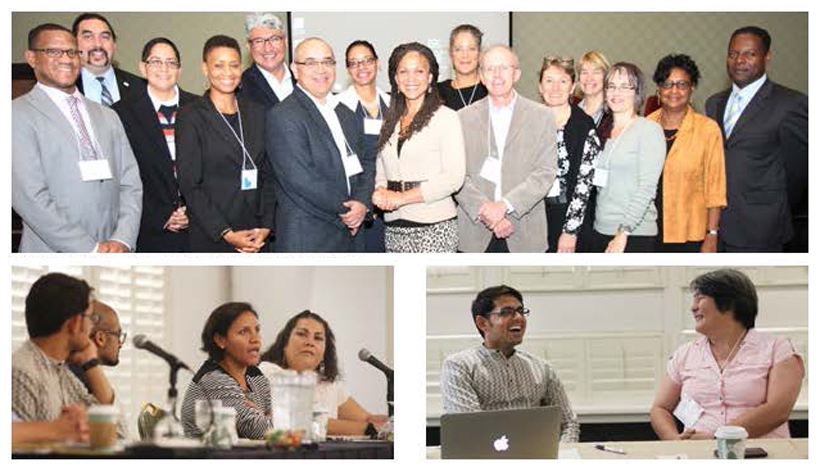News
From the newsletter: Creating—and Patching—the Pipeline
“If we haven’t fully provided opportunities for diverse, talented students to pursue advanced degrees and ultimately become faculty themselves, we will make only incremental progress,” notes Chiquita Collins, a 2004 WW Career Enhancement Fellow who is now Associate Dean for the Office of Diversity and Cultural Competence at the Johns Hopkins University School of Medicine.
A suite of three programs at the Woodrow Wilson Foundation has been working to provide such opportunities for more than 15 years. These programs—the Mellon Mays Fellows Professional Network, the MMUF Dissertation Support Program, and the Career Enhancement Fellowship—are part of a pipeline, supported by the Andrew W. Mellon Foundation, that helps promising young scholars launch and sustain academic careers.
All three programs (along with several counterparts at the Social Science Research Council) are part of and support the work of the Mellon Mays Undergraduate Fellowship (MMUF) program. Through an expanding network of 46 member campuses and consortia, the MMUF program supports undergraduates from underrepresented groups and others who have demonstrated academic ability and an aspiration to pursue a doctoral degree in selected humanities, social science, and physical science fields.
The Mellon Mays Fellows Professional Network (MMFPN) provides formal and informal networking and mentoring opportunities for MMUF alumni. Created in 2011, MMFPN events include in-person sessions on how to find and work with a mentor; regional mixers with graduate students and faculty; a set of webinars on how to apply to graduate school; and a new series of “grad school bootcamps” at which Fellows hone their applications to Ph.D. programs.
MMUF Fellows who are pursuing the Ph.D. can compete in the MMUF Dissertation Support Program, established in 2000, which comprises both Travel/Research Grants and Dissertation Grants. The former, awarded as Fellows prepare to write their dissertation, provide up to $5,000 for one summer or one semester of dissertation research, travel, and materials; the latter, for Fellows in the final year of dissertation writing, offers up to $20,000 for a 12-month period (depending on other funding sources). The Travel/Research funding, one recipient wrote, “was crucial to…my research, as very few funding sources exist to support anthropological fieldwork in the U.S.” “Because of this [Dissertation] grant,” wrote another, “I was able to focus on writing, editing, and researching my topic without extreme financial burdens.”
The Career Enhancement Fellowship, first offered in 2001, offers recipients both time and mentoring to make scholarly progress toward tenure. Awarded to junior faculty in their third year of a tenure-track appointment, the Fellowship supports scholars in core arts and sciences fields—both those from underrepresented groups and others who are committed to eradicating racial disparities, breaking down stereotypes, and promoting cross-racial understanding in their university communities.
As a growing number of MMUF Fellows complete the Ph.D.—more than 600, to date—the Career Enhancement Fellowship increasingly focuses on helping them attain tenure. The Fellowship supports a sabbatical of either a half-year or a full year, along with a $15,000–$30,000 stipend; a $1,500 grant for research, travel, and/or publication; attendance at a retreat where Fellows present their work; and a connection with a senior faculty mentor. This year, for the first time, the CEF program also offered two Adjunct Faculty Fellowships, providing a semester of support to two adjunct faculty as they seek to become more competitive for tenure-track positions.
Central to the Career Enhancement Fellowship—indeed, the entire suite of Mellon-funded programs at Woodrow Wilson—is an emphasis on community. One Fellow wrote, “Because of the CEF, I feel a sense of inclusion, belonging, and respect that I had not felt before. My mentor provided the sustained professional guidance that I had always craved. And having the imprimatur of the Mellon and Woodrow Wilson Foundations on my C.V., along with the publications that a year of research leave facilitated, has dramatically shifted how others (especially my chair) evaluate my status and value as an academic.”
“Moving up the professorial rank,” Chiquita Collins comments, “is no easy feat, and you are less likely to reach the pinnacle of becoming a tenured, full professor if you are a person of color and/or a woman—commonly referred to as the ‘leaky’ pipeline.” Together, the Woodrow Wilson Foundation’s MMUF and CEF programs patch that pipeline to the professoriate.
###
This story appeared in the spring 2016 issue of Fellowship, the newsletter of the Woodrow Wilson Foundation, in a section titled Diversity at WW. To see the full newsletter, click here.


